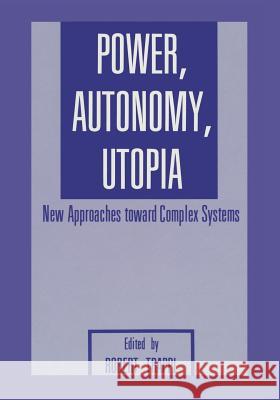Power, Autonomy, Utopia: New Approaches Toward Complex Systems » książka
Power, Autonomy, Utopia: New Approaches Toward Complex Systems
ISBN-13: 9781461293057 / Angielski / Miękka / 2011 / 176 str.
The "world" is becoming more and more intractable. We have learned to discern "systems" in it, we have developed a highly sophisticated math ematical apparatus to "model'" them, large computer simulation programs handle thousands of equations with zillions of parameters. But how ade quate are these efforts? Part One of this volume is a discussion containing some proposals for eliminating the constraints we encounter when approaching complex systems with our models: Is it possible, at all, to design a political or econom ic system without considering killing, torture, and oppression? Can we adequately model the present state of affairs while ignoring their often symbolic and paradoxical nature? Is it possible to explain teleological concepts such as "means" and "ends" in terms of basically 17th century Newtonian mechanics? Can we really make appropriate use of the vast a mount of systems concepts without exploring their relations, without de veloping a "system of systems concepts"? And why do more than 95% of all system modelling efforts end in just a heap of printed paper, and nothing else? Leading scientists from different disciplines, who have different viewpoints and use very different styles in presenting their message were invited to present their approaches to these and to other problems of equal importance: Either as Plenary Lectures at the Seventh European Meeting on Cybernetics and Systems Research at the University of Vienna, Austria, (Professors Stafford Beer, Helga Nowotny, and Robert Rosen (Ross Ashby Memorial Lecture)) or as Invited Lectures to the Austrian Society"











